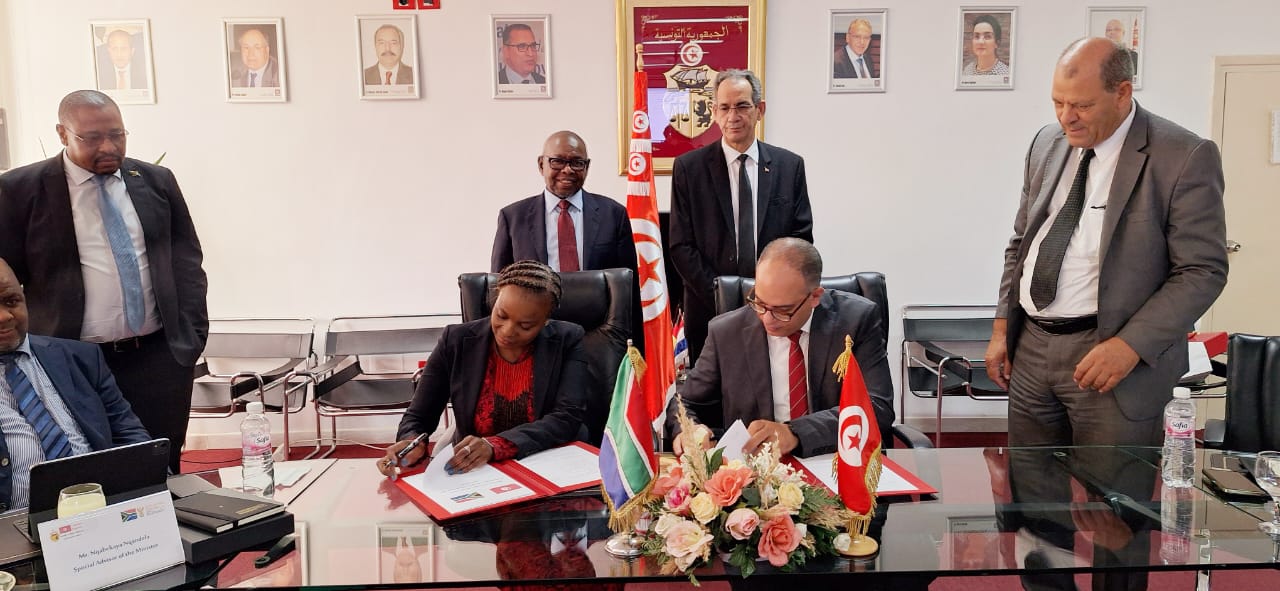South Africa, Tunisia Ink Major Science and Innovation Deal to Boost Africa STI
In his remarks, Minister Nzimande reflected on the shifting global geopolitical climate, warning of emerging political and economic pressures that demand a united African scientific response.

- Country:
- South Africa
In a pivotal development for African science and technology cooperation, South Africa and Tunisia have signed a comprehensive agreement to enhance collaboration in science, technology, and innovation (STI). The landmark agreement was formalised during the official visit of South Africa’s Minister of Higher Education, Science and Innovation, Dr. Blade Nzimande, to Tunisia, and forms a key component of the Scaling Up Tunisia–South Africa Strategy.
This strategic bilateral partnership is designed to accelerate innovation, foster research collaboration, and promote capacity building between the two countries, while aligning with broader continental goals under the African Union’s Science, Technology and Innovation Strategy for Africa (STISA-2024).
“We hold the view that African countries must intensify sub-regional science, technology and innovation cooperation and through this, mobilise more coherent support for the implementation of the African Union’s STI Strategy,” said Minister Nzimande.
A Comprehensive STI Roadmap
The newly signed agreement includes a detailed Plan of Action and the formal minutes of a joint research call meeting, setting out an ambitious path for collaboration across several thematic areas. Key components include:
-
Exchange programmes for students, researchers, and faculty
-
Inter-institutional partnerships between universities and research agencies
-
Joint research initiatives in priority scientific domains
-
Knowledge and skills transfer, particularly in digital innovation and engineering
-
Intellectual property rights (IPR) cooperation
-
Participation in international scientific programmes and forums
-
Joint governance and monitoring structures to guide implementation
According to South Africa’s Department of Science and Innovation (DSI), these collaborative efforts are aimed at harnessing STI to address critical challenges in healthcare, energy, food security, climate change, digital transformation, water management, and biodiversity conservation.
Diplomatic and Scientific Recognition
The agreement was signed in the presence of Tunisia’s Minister of Higher Education and Scientific Research, Professor Mondher Belaid, and other high-ranking officials. Minister Nzimande’s visit was underscored by warm diplomatic exchanges that reaffirmed Tunisia’s solidarity during South Africa’s anti-apartheid struggle and acknowledged long-standing relations in the education and research sectors.
To highlight the value of diplomacy in fostering science collaboration, Minister Nzimande presented the Science Diplomacy Award to Ms Hasna Tizaoui, Economic and Cultural Counsellor at the Tunisian Embassy in South Africa. The award, presented through South Africa’s annual Science Forum, recognised her instrumental role in building bilateral STI ties.
“Through our Science Forum South Africa, we awarded Ms Hasna Tizaoui with the prestigious Science Diplomacy Award to express our appreciation for the work done by your Embassy in South Africa,” Nzimande said.
Mobilising Africa's Science Diplomacy Power
In his remarks, Minister Nzimande reflected on the shifting global geopolitical climate, warning of emerging political and economic pressures that demand a united African scientific response. He called for African nations to scale up sub-regional cooperation in science and technology to strengthen resilience and self-sufficiency.
“We are now witnessing rising geopolitical tensions globally. This makes it more urgent for Africa to work together to ensure we are not left behind in science, innovation, and technological progress,” he added.
The agreement is seen as a strategic step toward building an African knowledge economy, where innovation drives inclusive growth and sustainable development. It builds on a previously existing framework of STI cooperation between South Africa and Tunisia, now expanded to include deeper research engagement, institutional linkages, and private sector involvement.
High-Level Delegation to Strengthen Ties
Minister Nzimande was accompanied by a high-level South African delegation that included senior representatives from key science and research institutions:
-
Council for Scientific and Industrial Research (CSIR)
-
Technology Innovation Agency (TIA)
-
National Research Foundation (NRF)
-
Mintek – Council for Mineral Technology
-
Officials from the Department of Science and Innovation (DSI)
These entities are expected to engage directly with Tunisian counterparts to activate joint programmes, conduct feasibility studies, and explore funding pathways for bilateral innovation projects.
Transforming Challenges into Shared Opportunities
Both South Africa and Tunisia face similar challenges in areas such as youth unemployment, skills development, infrastructure gaps, and environmental vulnerability. The agreement seeks to transform these challenges into opportunities through science-led solutions, including:
-
Green energy research
-
Climate-smart agriculture
-
Digital inclusion and AI for development
-
STEM education and training
-
Public health innovations
The joint action plan envisions community-driven innovation models and inclusive technology ecosystems, ensuring that STI benefits are shared across all segments of society.
Building Africa’s Scientific Future
The signing of this agreement represents a new era in African scientific diplomacy, one grounded in mutual respect, shared priorities, and visionary leadership. As South Africa and Tunisia pave the way for deeper STI cooperation, they are also laying the groundwork for Africa’s future as a global innovation powerhouse.
With implementation now underway, both nations have committed to measurable outcomes, transparent reporting, and a unified front in advancing science and innovation across the continent.










